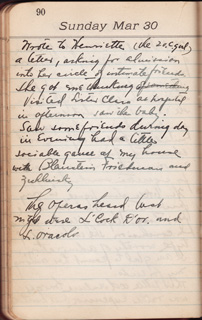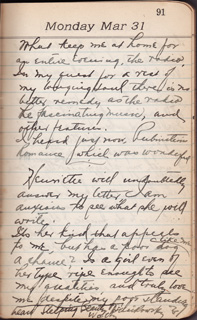
Went to Miss S.S. a
fine type of a girl, I wish
I had some affection for
her, went with her to the
park (Prospect), and another
picture of flaming youth,
by just getting friendly
with her.
The Enchanting atmosphere
in the stillness of the night
tempted me to take her in
my arms and kissed her.
Flaming youth
Nettie made an appointment
for me without my knowledge, but
I could not keep it as I had the above, the
girl came, according to
Nettie, she is a very pretty girl,
she will come again.
————-
Matt’s Notes
The expression “flaming youth” sounds like one of Papa’s own romantic turns of phrase, but it’s actually a reference to the title of a racy novel and its 1923 film adaptation. The story deals with the romantic trials of Pat Fentriss who, among other things, gets involved with her deceased mother’s ex-lover. The movie “endeavors to establish that young men and maidens wild are going up in the smoke of their own cigarettes,” said Time Magazine‘s film reviewer, who nevertheless found it “rather ingenious.”
Flaming Youth became a sensation partly because its relatively unknown young lead, the proto-flapper Colleen Moore, launched an era-defining trend by appearing on screen with bobbed hair. Moore became an immediate superstar and went on to appear in dozens of films, remaining “at the vanguard of fashion’s first revolution of the 20th century as skirts rose above the knee, bosoms vanished and waistlines slid down to the hips,” according to her New York Times obituary. While her name isn’t as recognizable as those of other silent greats, it’s easy to see from the clip below why she was so appealing:
Anyway, Papa’s feelings about such modern women were subject to change. To call a woman “naive” was one of his higher compliments (though he could also use it disapprovingly) and he hated a party earlier in the year because it was full of “wild women” and “Jazz babies…none of that good type which appeals to me and [is]so rare among women.” Later on, though, he became infatuated with a woman he nicknamed “The 20th Century Girl” because he admired, among other things, her “passion for cigarette smoking,” and still later he battled turbulent, mixed feelings for his distant cousin Clara and her outspoken, seductive ways.
It would be easy to say his standards were inconsistent because, like most mortal men, he had no standards that a pretty face couldn’t derail, but he really might not have known where he stood regarding the emerging flapper phenomenon. He was certainly possessed of an old-world, formal approach to courtship, and he disliked men who took advantage of women and “did not act gentlemanlike.” Also, at age twenty-nine in an era when twenty-nine was not so young, Papa may have had trouble embracing emerging dating habits and meeting the expectations of younger women who wanted to act like Colleen Moore.
Papa mixes tenses in this paragraph so I can’t tell whether he actually kissed “Miss S.S.” in Prospect Park or if he was just tempted to, but to even think about kissing a woman he didn’t feel strongly about clearly threw him for a loop and sent him searching the popular vernacular for the right words to describe it. The expression “flaming youth” was obviously in circulation by the time Papa wrote this entry1, and the way he repeats it makes me think he was either taking it for a test run (as he did with the phrase “date her up” a few days earlier) or was genuinely amazed by the bold, permissive world in which he now found himself.
—————
Additional references for this post:
- 1 – “Flaming Youth” would also become the title of a Duke Ellington song, a Kiss song, and the name of Phil Collins’ first band.
- Colleenmoore.org – As you would imagine, this site has everything you want to know about Colleen Moore
- Flaming Youth’s synopsis at allmovie.org. Alas, it looks like only a short piece of the film survives.


 Speaking of which, the song this “poor dog” listened to, “Rubenstein’s Romance,” was a classical piece by Anton Rubinstein properly called “Romance in B-flat, Op. 44, No.1.” A popular adaptation known as “If You Are But a Dream” became a Frank Sinatra hit, and though this didn’t happen until the 1940’s I think the lyrics sum up Papa’s feelings about Henreitte:
Speaking of which, the song this “poor dog” listened to, “Rubenstein’s Romance,” was a classical piece by Anton Rubinstein properly called “Romance in B-flat, Op. 44, No.1.” A popular adaptation known as “If You Are But a Dream” became a Frank Sinatra hit, and though this didn’t happen until the 1940’s I think the lyrics sum up Papa’s feelings about Henreitte:


